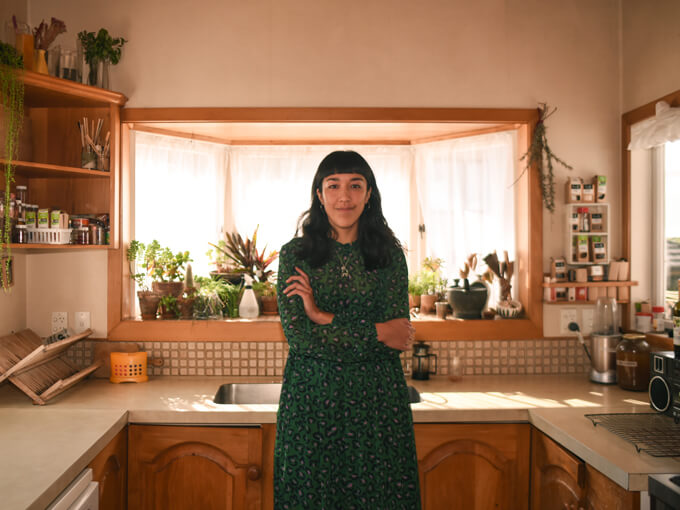Oct 18, 2019 Politics
What’s it like to spend months of your life campaigning for a local government role, and not get in? Yeshe Dawa, aka the Midnight Baker, tells Tess Nichol about her run for the Albert-Eden local board.
Everyone wants to be Chlöe Swarbrick – the social media whizz and noted young person who turned a failed mayoral campaign into a successful political career.
Swarbrick’s meteoric rise highlighted the crucial fact that there simply aren’t enough young people in positions of power in this country, from local board all the way through to national Government. Which has since got a lot of other young* (*by government standards, anyway) people thinking – hey why shouldn’t I give that a crack?!
Well, it’s a lot of hard mahi, as cafe-owner-turned-political-aspirant Yeshe Dawa found out. After throwing her hat in the ring on the City Vision ticket for the Albert-Eden local board, Dawa spent hundreds of hours door knocking, leafleting, waving placards, attending meetings, strategising and profile-boosting (including being featured in a piece for the latest issue of Metro) – only to end up with the least number of votes in her area.
But Dawa (aka the Midnight Baker) is grateful to each and every one of the 4345 people who voted for her. “It was shitty, but that’s only because I’m an overachiever and I hate coming last. But I think if I want to reframe that scenario: 4345 people still voted for me, and they didn’t have to!”
These are Dawa’s highs and lows of campaigning for local board:
LOWS
Realising how many people don’t really care about local government: “Once you become engaged in the whole process and [know], for example, how much money is involved, and how little people know or care how those resources are spent on their behalf it just crushes your soul a little bit. There are all of these resources there, these people are here to represent you and a lot of people have no idea who they are and they don’t seem to care and they don’t think their vote will have any impact on the whole process – but it really does. There are people who are getting in on quite small majorities, so every single vote counts.”
Realising how many people wanna be Frank Underwood: “I know it’s politics, but there was a lot of politicking. I must be in my own little bubble, because at a meet the candidates event I was so shocked by the kinds of language and behaviour and tactics used. It wasn’t a debate or an even-keeled conversation. There were little sly underhanded comments and negative insinuations and I was just like ‘what the fuck are we not all here to be open and honest and real?’ It was really bizarre.”
Being talked over: “I’d allow opposing candidates to speak and think ‘ok, this person will obviously give me a chance to speak as well’, and it’s like no no no no, they will not. They’ll just talk and talk until they’re made to stop, and you have to make that room for yourself; that was a real big lesson.”
Facebook: “There’s so much stuff on the community Facebook pages where people are so belligerently not seeing the facts for what they are and just stomping their feet and throwing tantrums like bratty little teenagers… it’s just like what the fuck is going on. I was so shocked, aren’t we all adults here, can’t we have a civilized conversation about what needs to be done and how it gets done?”
HIGHS
Learning from more experienced candidates: “It’s endlessly interesting being part of a campaign like that. It’s like getting a crash course in political science in two and a half months. I felt like I was this sponge absorbing so much knowledge and information about how things work, about all the different people out there. It was extremely eye-opening.”
Changing her perspective: “Once you see all of those things about how it all works, you can’t unsee it. Now when I’m walking around the neighbourhood, I’ll see something and think ‘oh I wonder if local board can fix that, or oh I can see local board is doing this’ – it’s like a whole other lens.”
Seeing how many people do care: “I’ve met so many community organisations and super-passionate people who have dedicated a significant amount of time to see the people and the places they care about thrive, and a lot of it is volunteer work as well.”
Connecting more deeply with her community: “With doorknocking, you’re going right up to someone you’ve never met before and it’s such an interesting sociological experience. Some people want to chat with you and others slam the door in your face. You talk with people you’d never usually talk to. As soon as you open the opportunity for people to talk, a significant amount of time they’ll just talk and talk and tell you everything they’re frustrated about, all the things that they love about their community and all you have to do is stand there and listen. It’s the most amazing experience.”
The above has been edited for clarity and length.
Follow Metro on Twitter, Facebook, Instagram and sign up to our weekly email






